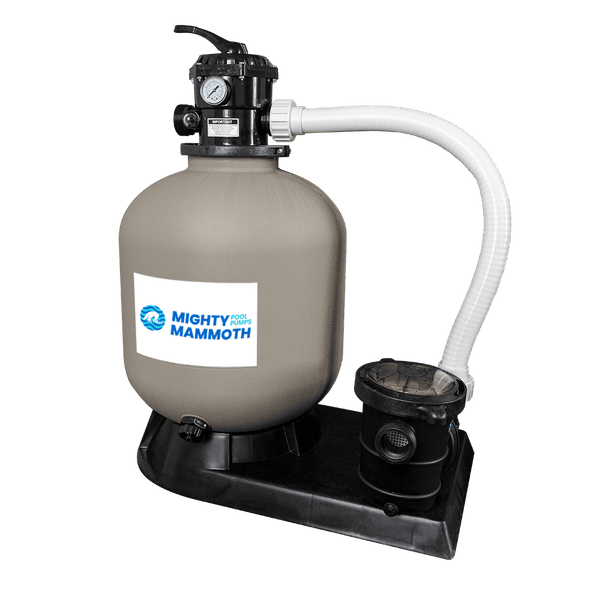How Does a Sand Filter Work for Above Ground Pools?
Updated: November 22, 2023
In the world of above ground pool maintenance, ensuring crystal-clear water is not just about aesthetics; it’s a fundamental aspect of creating a safe and enjoyable swimming environment.
This blog aims to dive into the vital role of water filtration in above ground pools, emphasizing the significance of maintaining optimal water quality. Specifically, we’ll focus on one of the most popular and efficient filtration methods for above ground pools – sand filters.
These systems play a pivotal role in keeping pool water clean by removing impurities, and this blog serves as a guide to unravel the mechanics behind sand filtration. By understanding the intricacies of this process, pool owners can make informed decisions about their filtration systems, ultimately contributing to a refreshing and pristine pool experience.
Importance of Filtration in Above Ground Pools
Filtration is crucial for above ground pools, acting as a key defense against debris and bacteria to keep the water clear and safe. Beyond aesthetics, it also protects pool equipment, extending its lifespan and ensuring a consistently enjoyable swimming experience.
Common Pool Contaminants
Common pool contaminants encompass a variety of substances that can adversely affect the quality of pool water. Some of the most prevalent contaminants include:
- Organic Matter: Leaves, grass, pollen, and other plant debris can accumulate in pools, providing a breeding ground for bacteria and algae.
- Inorganic Particles: Dirt, dust, and other particulate matter can enter the pool through various means, making the water appear cloudy and reducing its clarity.
- Bacteria and Microorganisms: Pathogenic bacteria, algae, and fungi can multiply in untreated water, posing health risks and causing issues such as green or discolored water.
- Chemical Contaminants: Sunscreen, lotions, and body oils introduced by swimmers contribute to the chemical load in the pool, affecting water balance and clarity.
- Metals: Trace amounts of metals, such as iron and copper, can enter the pool through source water or other external factors, leading to discoloration and staining.
Effectively managing and removing these contaminants is essential for maintaining a safe, clear, and inviting pool environment. Regular filtration, proper water chemistry, and routine maintenance are key aspects of keeping pool water free from these common contaminants.
Basics of Water Filtration for Pools
Mechanical Filtration in Pool Maintenance
Mechanical filtration in pool maintenance is about physically removing debris and particles from the water using a filtration system. This process, accomplished through filters like sand, cartridge, or diatomaceous earth (DE), captures contaminants, preventing them from circulating back into the pool.
As water passes through the filter, it traps particles like leaves and dirt, ensuring the pool water remains clean. Regular maintenance of these filters is essential for their effective performance in keeping the pool water clear and healthy.
Comparison of Different Filtration Methods
Sand Filters
- Advantages
- Cost-Effective: Sand filters are generally more affordable upfront compared to other filtration methods.
- Low Maintenance: Maintenance is relatively straightforward, primarily involving backwashing to clean the sand bed.
- Suitable for Most Pools: Effective for standard residential pools and those with lower filtration demands.
- Considerations
- Larger Particle Size: Sand filters are less efficient at trapping smaller particles compared to cartridge and DE filters.
- Backwashing Water Usage: The backwashing process can lead to higher water consumption.
Cartridge Filters
- Advantages
- Fine Particle Removal: Cartridge filters excel at trapping smaller particles, providing superior water clarity.
- Lower Water Wastage: Cartridge filters don’t require backwashing, reducing water consumption.
- Easy Maintenance: Cleaning involves hosing off or soaking the cartridges periodically.
- Considerations
- Initial Cost: Cartridge filters may have a higher initial cost compared to sand filters.
- Replacement Cost: Cartridges need replacement every few years, incurring additional costs.
Diatomaceous Earth (DE) Filters
- Advantages
- Exceptional Filtration: DE filters offer the finest level of filtration, capturing even microscopic particles.
- High Efficiency: Known for providing crystal-clear water due to their superior filtration capabilities.
- Longer Filter Cycles: DE filters typically have longer filter cycles before requiring backwashing.
- Considerations
- Initial and Operating Cost: DE filters often have a higher initial cost, and the DE powder adds to operational expenses.
- Complex Maintenance: The recharge process involves adding DE powder, which can be a more involved maintenance task.
Why Sand Filters Are Popular for Above Ground Pools
Sand filters are favored for above ground pools due to their cost-effectiveness, making them a budget-friendly choice for many homeowners. Their low maintenance requirements, involving simple backwashing to remove debris, appeal to those seeking an easy-to-operate filtration system.
Additionally, the durability, accessibility, and suitability of standard residential pools contribute to the popularity of sand filters in the above ground pool market.
Components of a Sand Filter for Above Ground Pools
The components of a sand filter for above ground pools play a crucial role in its functionality and efficiency. The tank structure, typically made of durable materials such as high-density polyethylene or fiberglass, ensures the integrity of the filtration system.
The pump and motor specifications are vital elements determining the flow rate and pressure necessary for optimal filtration.
Within the filter tank, the choice and arrangement of filter media are key factors. This includes layers of coarse gravel for initial sediment removal, followed by fine sand to trap smaller particles.
Some advanced systems may incorporate additional layers like anthracite or activated carbon for enhanced filtration. The synergy of these components ensures that the sand filter operates effectively, keeping above ground pool water clean and clear.

SHOP LINERWORLD’S SAND FILTER TANK SYSTEMS
The Filtration Process in Above Ground Pools
In above ground pools equipped with sand filters, the filtration process is a systematic sequence that ensures the removal of impurities for clean and clear water.
- First, water is drawn from the pool through the intake, typically located near the bottom.
- This water is then directed to the filter tank, where it undergoes a crucial distribution process across the filtration media. The filtration media in a sand filter for above ground pools usually includes layers of gravel and sand. As the water passes through these layers, impurities such as debris, dirt, and other particles are trapped.
- The third step involves the actual filtration of these impurities, with the sand acting as a natural sieve to capture contaminants.
- Finally, the now filtered and purified water is collected and returned to the pool, completing the cycle.
This step-by-step process showcases how a sand filter efficiently removes impurities from above ground pool water, contributing to a refreshing and enjoyable swimming experience.
10 Maintenance Tips for Sand Filters in Above Ground Pools
Maintaining a sand filter is crucial for the ongoing efficiency of your above ground pool system. Here are some essential maintenance tips:
1. Regular Backwashing
Backwashing is the process of reversing the water flow through the filter to flush out trapped debris. Regular backwashing, typically when the pressure gauge indicates a 7-10 psi increase, helps prevent clogs and ensures optimal filtration.
2. Monitor Pressure Gauges
Keep an eye on the pressure gauges attached to the filter system. An abnormal increase in pressure may signal a clogged or dirty filter, indicating the need for backwashing.
3. Chemical Balance
Maintain proper chemical balance in the pool water. Balanced water reduces the likelihood of algae growth and prevents the filter from working harder than necessary.
4. Inspect and Clean the Pump Basket
Check and clean the pump basket regularly to ensure it is free from debris. A clogged basket can restrict water flow, affecting the efficiency of the entire filtration system.
5. Inspect and Replace Sand
Periodically inspect the sand within the filter. Over time, the sand may become compacted or worn, reducing its effectiveness. If needed, follow manufacturer recommendations for replacing the sand.
6. Inspect Seals and Gaskets
Check for any leaks around the filter and pump connections. Damaged seals or gaskets can lead to water leakage, affecting the performance of the filtration system.
7. Winterization
If you live in an area with cold winters, properly winterize your above ground pool and sand filter. This may involve draining the filter and protecting it from freezing temperatures.
8. Professional Inspection
Consider scheduling periodic professional inspections to ensure all components of the sand filter system are in good condition and functioning optimally.
9. Avoid Overuse of Clarifiers
While pool clarifiers can be useful, excessive use may lead to clogging of the sand bed. Use clarifiers sparingly and follow the manufacturer’s guidelines.
10. Follow Manufacturer Guidelines
Always adhere to the manufacturer’s guidelines for maintenance and operation. Specific recommendations can vary, so consulting the manual is essential for proper care.
By incorporating these maintenance tips into your routine, you can maximize the lifespan of your sand filter and ensure consistently clean and clear water in your above ground pool.
Water Filtration for Your Above Ground Pool
As you can see, effective filtration is vital for maintaining a clean and inviting above ground pool. Specifically, sand filters offer above ground pool owners a cost-effective and easy-to-maintain solution, making them a practical choice for residential pools.
The straightforward design of sand filters, coupled with their practical benefits, plays a key role in achieving and sustaining crystal-clear pool water. By grasping the basics and conducting routine maintenance, pool owners can enjoy a consistently refreshing pool environment for family and friends.


